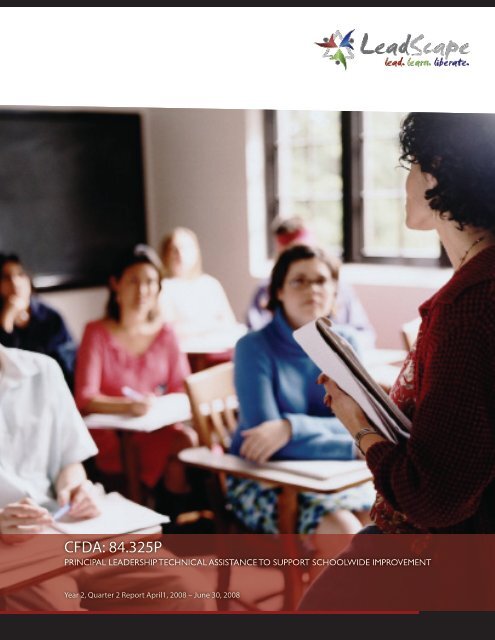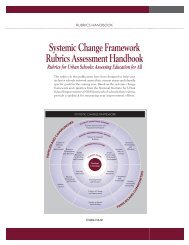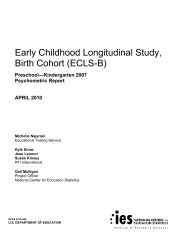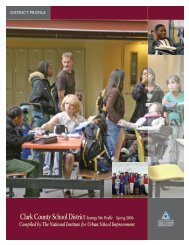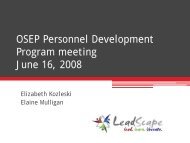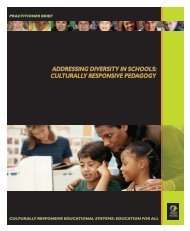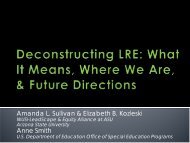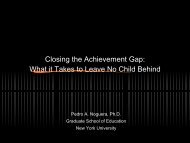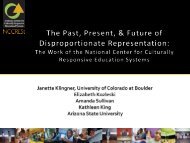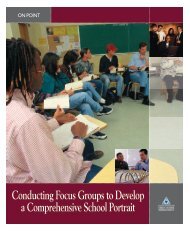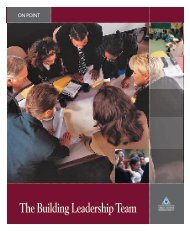CFDA: 84.325P - NIUSI Leadscape
CFDA: 84.325P - NIUSI Leadscape
CFDA: 84.325P - NIUSI Leadscape
Create successful ePaper yourself
Turn your PDF publications into a flip-book with our unique Google optimized e-Paper software.
<strong>CFDA</strong>: <strong>84.325P</strong><br />
PRINCIPAL LEADERSHIP TECHNICAL ASSISTANCE TO SUPPORT SCHOOLWIDE IMPROVEMENT<br />
Year 2, Quarter 2 Report April1, 2008 – June 30, 2008
TABLE OF CONTENTS<br />
LEADERSHIP. . . . . . . . . . . . . . . . . . . . . . . . . . . . . . . . . . . . . . . . . . . . . . . . . . . . . . . . . . . . . 3<br />
PROJECT OVERVIEW .. . . . . . . . . . . . . . . . . . . . . . . . . . . . . . . . . . . . . . . . . . . . . . . . . . . . . 4<br />
CONTINUOUS IMPROVEMENT.. . . . . . . . . . . . . . . . . . . . . . . . . . . . . . . . . . . . . . . . . . . . 5<br />
RESEARCH AND DEVELOPMENT.. . . . . . . . . . . . . . . . . . . . . . . . . . . . . . . . . . . . . . . . . . . 6<br />
PROFESSIONAL DEVELOPMENT. . . . . . . . . . . . . . . . . . . . . . . . . . . . . . . . . . . . . . . . . . . . 6<br />
NETWORKING AND DISSEMINATION.. . . . . . . . . . . . . . . . . . . . . . . . . . . . . . . . . . . . . . 7<br />
N I U S I L E A D S C A P E . O R G<br />
2
LEADERSHIP<br />
PRINCIPAL INVESTIGATOR<br />
Elizabeth B. Kozleski<br />
Director and Principal Investigator<br />
Arizona State University<br />
PROJECT COORDINATOR<br />
Elaine Mulligan<br />
Project Coordinator<br />
Arizona State University<br />
PROJECT OFFICER<br />
Anne Smith<br />
Project Officer<br />
Office of Special Education Programs<br />
U.S. Department of Education, Washington, D.C.<br />
STAFF<br />
Michael Knapp<br />
Software Designer<br />
Green River<br />
Aaron Michal<br />
Software Designer<br />
Green River<br />
Crystal Rueb<br />
Office Specialist<br />
Arizona State University<br />
ADVISORY BOARD<br />
Alfredo Artiles<br />
Arizona State University<br />
Frank Bingham<br />
University of Colorado at Denver<br />
and Health Sciences Center<br />
Stan Buckley<br />
Jefferson County Public Schools<br />
Beverly Cross<br />
University of Memphis<br />
Paula Goldberg<br />
PACER Center<br />
Charlene Green<br />
Clark County School District<br />
Joe Johnson<br />
National Center for Urban<br />
School Transformation<br />
John Radloff<br />
Guideworks, LLC<br />
Paul Teske<br />
University of Colorado at Denver<br />
and Health Sciences Center<br />
GRADUATE ASSISTANTS<br />
Carlos Calderon<br />
Angela Clark-Oates<br />
Wendy Duran<br />
Bradley Herron<br />
Pratap Joseph<br />
Kathleen King<br />
Latha Mukkavilli<br />
Rebecca Neal<br />
Amanda Sullivan<br />
Federico Waitoller<br />
N I U S I L E A D S C A P E . O R G<br />
3
Project Overview<br />
In spite of powerful federal legislation, embodied in the IDEA<br />
reauthorization of 2004, schools and local educational agencies<br />
continue to serve almost 50% of all students with disabilities in<br />
separate classrooms and schools. IDEA mandates that students<br />
with disabilities receive their education with non-disabled<br />
peers to the maximum extent appropriate. However, by 2003,<br />
according to the U.S. Department of Education, only about half<br />
of all students with disabilities nationally were being educated<br />
for more than 80% of the day in general education classrooms.<br />
Evidence from two large national studies, the second National<br />
Longitudinal Transition Study and the Special Education<br />
Elementary Longitudinal Study (SEELS), suggest that students<br />
with disabilities who spend more time in general education<br />
classrooms tend to be absent less, perform closer to grade<br />
level than their peers in pull-out settings, and have higher<br />
achievement test scores (Blackorby et al., 2005).<br />
While NCLB has focused public and professional attention on<br />
the outcomes of education through annual measurement of<br />
student progress; focus on annual yearly progress on a school<br />
by school basis; and disaggregating of test scores by race/<br />
ethnicity, English language learners, and students in special<br />
education; special education services remain much as they<br />
were in the eighties and early nineties. Special education<br />
experiences a troublesome and persistent overrepresentation<br />
of students who are culturally and linguistically diverse,<br />
particularly in urban areas (Donovan & Cross, 2002). Further,<br />
students who are African-American and Latino are more<br />
likely than White and Asian-American students to be in more<br />
segregated placements.<br />
Schools need to develop their capacity to teach students who<br />
are culturally and linguistically diverse within general education<br />
using research-based teaching and learning practices that<br />
produce high quality learning for all students. Further, special<br />
education needs to become a proactive, preventative system<br />
that does not wait for students to fall behind before they get<br />
the educational supports needed to learn. This means that the<br />
roles of special educators and related service providers must<br />
be reconceptualized to enhance whole school improvement.<br />
Through collaborative professional learning opportunities,<br />
special and general educators must work together to support<br />
learning in the general education curriculum.<br />
This kind of change requires local leadership. Principals<br />
must engage whole school improvement that binds special<br />
and general education in a seamless learning system for<br />
all students. To ensure that principals have the technical<br />
knowledge and skills to be instructional leaders for all students<br />
is a daunting task. To do so, knowing that principals change<br />
positions frequently, requires a response that grounds learning<br />
in present circumstances but bridges future changes by<br />
anchoring learning and development to web-based, e-learning<br />
solutions that provide multiple kinds of tools for knowledge<br />
development, diffusion, implementation, and continuous<br />
improvement. Enter <strong>NIUSI</strong>-LeadScape.<br />
The National Institute for Urban School Improvement<br />
(<strong>NIUSI</strong>) has established a principal leadership professional<br />
development center, LeadScape, which supports school<br />
improvement to ensure access to and participation and<br />
progress in the general education curriculum in the least<br />
restrictive environment. Originally titled the <strong>NIUSI</strong> Principal<br />
Leadership Academies iNitiative (<strong>NIUSI</strong>-PLAN), the center’s<br />
name was changed to LeadScape in order to increase its<br />
marketability. <strong>NIUSI</strong> is an OSEP-funded technical assistance<br />
and dissemination project with almost 10 years of national<br />
experience in supporting the development of networks of<br />
schools as they develop robust practices for ensuring that<br />
students with disabilities have access to and participate<br />
successfully in the general education environment.<br />
LeadScape directly assists at least 400 principals across the<br />
country to develop, implement, and sustain inclusive schools<br />
ensuring that ALL students with and without disabilities meet<br />
or exceed academic standards set by each state and measured<br />
by state assessment systems. Based on the tools and products<br />
developed and field tested by <strong>NIUSI</strong>, LeadScape has developed<br />
an electronic platform called LeadScape to bring principals<br />
from around the country together, in sustained professional<br />
communities, focused on leadership for inclusive schools. The<br />
platform makes it possible to incorporate effective researchbased<br />
strategies and methods for professional learning as<br />
well as effective research-based content and tools focused on<br />
information that principals need to know and do to achieve<br />
and sustain effective, inclusive schools. An important part<br />
of this work is the direct technical assistance, coaching, and<br />
mentoring that <strong>NIUSI</strong> LeadScape provides to principals both<br />
N I U S I L E A D S C A P E . O R G<br />
4
online and in-person.<br />
LeadScape is developing powerful networks of principals<br />
that embrace and implement evidence-based, systemic<br />
school improvement approaches for inclusive practices. The<br />
initiative is organized into four action arenas, each of which<br />
has a core team that implements the goal, objectives and<br />
manages the timelines. These goals include (1) continuous<br />
improvement systems for classrooms, schools, and school<br />
systems; (2) ongoing participatory research and development<br />
to inform and improve outcomes for all students; (3) inclusive,<br />
culturally responsive professional learning that results in<br />
improved outcomes for all students; and (4) networking and<br />
dissemination that extends the reach of this project and<br />
impacts practice nationally.<br />
This report describes LeadScape’s activities for the past quarter,<br />
focusing on our progress in meeting our goals and objectives<br />
in each of the four action arenas. For this first quarter of 2008,<br />
the Center’s primary activities have revolved around the launch<br />
of the LeadScape platform and providing professional learning<br />
and technical assistance to participating principals.<br />
ACCOMPLISHMENTS<br />
Year 2, April 1 – June 30, 2008<br />
• Winter Principals’ Institute in Scottsdale, AZ.<br />
• Implementation of coaching process.<br />
• Development of data maps in progress.<br />
• LeadScape website updated monthly.<br />
• LeadScape blog launched.<br />
• New Practitioner Brief published.<br />
• Summer Institute planning completed.<br />
• Provided technical assistance in Memphis, TN.<br />
• 4 new principals added.<br />
Continuous Improvement<br />
GOAL 1: INCREASE KNOWLEDGE AND UNDERSTANDING<br />
OF INCLUSIVE EDUCATION THROUGH CONTINUOUS<br />
ASSESSMENT OF CURRENT PRACTICE, CHANGE EFFORTS AND<br />
IMPACT.<br />
1.1 Create, launch, and refine the LeadScape platform<br />
1.2 Engage principals in data analysis, school<br />
improvement planning, and implementation.<br />
1.3 Track changes over time in sites and within the project<br />
using project management tools.<br />
SUMMARY<br />
The work of the Continuous Improvement Core Team has<br />
focused on refining the LeadScape website and platform and<br />
on engaging the pilot group of principals in data analysis<br />
and school improvement planning. This period, project staff<br />
continued implementation and refinement of a new coaching<br />
process to facilitate these processes. Principals receive ongoing<br />
biweekly coaching and mentoring via email and phone.<br />
Individual goals for all participating principals were reviewed at<br />
the end of the academic year. In addition, technical assistance<br />
was provided in Memphis, TN regarding training special<br />
education personnel on how to write IEP Services page for<br />
inclusive classes.<br />
This quarter, a School Improvement Plan tool was added to<br />
the LeadScape platform to allow principals to manage their<br />
goals. This new addition also includes a task tracker function<br />
to help users keep track of assigned duties Data maps for our<br />
participating schools are in progress. Graphic representations<br />
have been created for four new schools in addition to Orlando.<br />
In May, the LeadScape advisory board convened to review<br />
activities and progress and to provide feedback and ideas for<br />
future directions, including ways to improve the platform and<br />
expand content to address important issues.<br />
ACCOMPLISHMENTS<br />
• Implementation of coaching process.<br />
• Development of data maps in progress.<br />
• LeadScape website updated monthly.<br />
NEXT STEPS<br />
• Continued development of LeadScape platform.<br />
• Monthly updates to the LeadScape website.<br />
• Continue providing individualized technical assistance<br />
N I U S I L E A D S C A P E . O R G<br />
5
to participating principals via site visits, conference<br />
calls, and email.<br />
• Continue to build data maps for participating districts.<br />
Research and Development<br />
GOAL 2: PRODUCE A SET OF 20 RESEARCH SYNTHESES<br />
THAT ADDRESS THE NEEDS OF PRACTITIONERS AND<br />
DECISION-MAKERS.<br />
2.1 Complete a synthesis of available research literature<br />
within the first 6 months of the project start date<br />
including a review of current <strong>NIUSI</strong> products and<br />
audience needs<br />
2.2 Edit, review, and produce 4 new products per year<br />
2.3 Design and launch dialogue guides for each product<br />
to be launched on LeadScape<br />
SUMMARY<br />
This quarter, a new Practitioner Brief was published. Written by<br />
Drs. Beth Harry and Robin Waterman, Building Collaboration<br />
Between Schools and Parents of English Language Learners:<br />
Transcending Barriers, Creating Opportunities extends our<br />
work building culturally responsive educational systems to<br />
parents of students identified as English language learners (ELL),<br />
beginning with the premise that parents of students who have<br />
been identified as ELL are a vital source of support for increasing<br />
student engagement, bringing profound commitments and<br />
motivation to the school community.<br />
The R&D team continued work on LeadScape core concepts<br />
paper “Leadership for Inclusive Schools: A Conceptual<br />
Framework and Review of Literature.” This document synthesizes<br />
the existing literature on inclusive schools and explores issues of<br />
social justice, education policy and case law, disproportionality,<br />
and the conceptualization of principalship.<br />
ACCOMPLISHMENTS<br />
• Core concepts paper revisions in progress.<br />
• New Practitioner Brief published.<br />
NEXT STEPS<br />
• Publish core concepts paper.<br />
Professional Development<br />
GOAL 3: LEVERAGE CONTINUED IMPROVEMENT OF INCLUSIVE<br />
PRACTICES IN SCHOOLS THROUGH COLLABORATIVE<br />
WORK WITH PRINCIPAL LEADERS FOCUSING ON RESEARCH<br />
VALIDATED PRACTICES IN THE SCHOOL IMPROVEMENT<br />
PROCESS, COLLECTION AND USE OF EVIDENCE,<br />
UNIVERSAL DESIGNS FOR LEARNING, EARLY INTERVENING,<br />
RESPONSE TO INTERVENTION, AND CULTURALLY RESPONSIVE<br />
PRACTICES<br />
3.1 Recruit, select, and convene 400 principals across the<br />
U.S. for inclusive education leadership development.<br />
3.2 Produce 5 online leadership modules for LeadScape.<br />
3.3 Refine <strong>NIUSI</strong> coaching process using webinars, enews,<br />
email, weekly phone calls, and site visits.<br />
SUMMARY<br />
Planning is well underway for the LeadScape Summer Institute<br />
in Seattle, WA July 14-17. Principals from throughout the nation<br />
will be gathering to engage in professional learning to support<br />
a number of outcomes, including:<br />
• Match Instructional Designs to Inclusive Education Goals<br />
• Develop Whole School Approach to Support Positive<br />
Behavior<br />
• Improve Student Engagement<br />
• Focus School Improvement Efforts on Systemic Design<br />
• Network to Improve Results for Students<br />
The Institute will feature several speakers including Sue<br />
Abplanalp, Jack Jorgenson, Dorothy Garrison-Wade, Rob<br />
Horner, and Shelley Zion, as well as project leadership, who<br />
will address a variety of topics such as instructional models,<br />
instructional design, positive behavior supports, student voice,<br />
and leadership identity.<br />
ACCOMPLISHMENTS<br />
• Planning for Summer Institute completed.<br />
N I U S I L E A D S C A P E . O R G<br />
6
NEXT STEPS<br />
• Summer Institute<br />
• Complete RTI Module.<br />
Networking and<br />
Dissemination<br />
GOAL 4: ENGAGE NATIONAL DISCOURSE IN LOCAL,<br />
PROFESSIONAL PRACTICE, AND POLICY COMMUNITIES ON<br />
IMPROVING EDUCATIONAL OUTCOMES FOR ALL STUDENTS.<br />
4.1 Expand existing network to 16,000 participants.<br />
4.2 Infuse regional accreditation standards with <strong>NIUSI</strong><br />
inclusive education standards thru CITA.<br />
4.3 Increase the usage of LeadScape from 400 to 1,000<br />
principals.<br />
SUMMARY<br />
This period, LeadScape launched a new interactive blog on the<br />
project website. Our blog now features scholars, researchers,<br />
and teacher educators, who inform, share and provoke<br />
discussions about the complexities of leadership for equity<br />
and inclusiveness in teaching and learning. Like Anais Nin’s<br />
astute observation about the purpose of art, we hope that the<br />
blog will function to challenge perceptions about inclusive<br />
education, equitable practices, and systemic change. She<br />
writes, “What we are familiar with we cease to see. The writer<br />
shakes up the familiar scene, and, as if by magic, we see a new<br />
meaning in it.” Our first guest writer was Dr. Mike Rose. He<br />
is on the faculty of the UCLA Graduate School of Education<br />
and Information Studies and the author of Possible Lives: The<br />
Promise of Public Education in America, recently released by<br />
Penguin with a new preface, and The Mind at Work: Valuing<br />
the Intelligence of the American Worker. The second posting<br />
featured a piece by Dr. Julio Cammarota, where he discussed<br />
the achievement gap between Latina/os. Julio Cammarota<br />
is an assistant professor in the Bureau of Applied Research in<br />
Anthropology and the Mexican-American Studies and Research<br />
Center at the University of Arizona. His research focuses on<br />
participatory action research with Latina/o youth, institutional<br />
factors in academic achievement, and liberatory pedagogy.<br />
He is currently the co-director of a youth participatory action<br />
research program, the Social Justice Education Project (SJEP).<br />
Last year, five districts from North Carolina, Wisconsin,<br />
Tennessee, Florida, and Arizona were selected to participate<br />
in our pilot group of principals that would test the LeadScape<br />
platform, based on the principals’ dedication to inclusive<br />
education and culturally responsive practice. This period, four<br />
new principals have joined LeadScape’s pilot group:<br />
• Whitney Oakley of Sylvan Elementary in Snow Camp, NC<br />
• Rea Goklish of John F. Kennedy Day School in Cedar Creek,<br />
AZ (White Mountain Apache Reservation)<br />
• Rebeckah Winans of Fuller Elementary in Tempe, AZ,<br />
• Laura Suprenard of Shingle Creek Elementary in Orlando,<br />
FL.<br />
Month Hits Visitors<br />
April 17,922 206<br />
May 12,509 208<br />
June 30,495 827<br />
ACCOMPLISHMENTS<br />
• 4 new principals added to pilot group.<br />
• Presentation at OSEP Personnel Preparation Meeting in<br />
June.<br />
• 60,926 hits to the website<br />
NEXT STEPS<br />
• Continue recruiting new principals.<br />
• Present information about <strong>NIUSI</strong>-LeadScape to TA&D<br />
Information Services Group.<br />
JULY PRINCIPALS’ INSTITUTE: Angela Whitelaw, Chloé Sims, Harold Beaver, Cynthia Alexander, and Gloria Williams<br />
N I U S I L E A D S C A P E . O R G<br />
7
NOTES<br />
N I U S I L E A D S C A P E . O R G<br />
8


